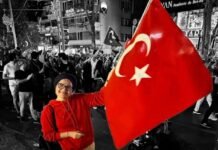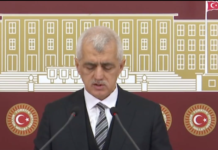
A top media executive and a veteran journalist has been languishing behind bars for 457 days without any evidence indicating that he has committed a crime other than working for a critical media outlet.
Faruk Akkan, 46-year-old top manager of Cihan news agency that was Turkey’s largest privately-funded news service before the government’s unlawful takeover in March 2016, faces three consecutive life sentences and additional 15 years in jail if he gets convicted. Akkan has been accused of terrorism charges just like most jailed journalists in Turkey’s prisons as part of the government campaign to muzzle critical, independent and opposition journalists.
 Akkan is considered to be among few experts on Russia in Turkey given his long-years of works as the Bureau Chief in Moscow for critical daily Zaman, one-time best-selling newspaper in Turkey before forcible shut-down by the government, as well as Cihan.
Akkan is considered to be among few experts on Russia in Turkey given his long-years of works as the Bureau Chief in Moscow for critical daily Zaman, one-time best-selling newspaper in Turkey before forcible shut-down by the government, as well as Cihan.
He was formally arrested on August 4, 2016 after being detained 10 days at İstanbul Police Department on Vatan Street, a detention center where is notorious for torture and ill-treatment for detainees. He faced irrelevant questions such as explaining the newspaper company’s downsizing strategy back in 2014 when he was not even in Turkey. He told his interrogators that he lived in Moscow between 2006 and 2015 as a reporter and he did not have any knowledge of company’s business operations before he returned to Turkey at the end of 2015.
The journalist was accused of continuing to work in the news service Cihan when Turkey’s biggest corruption investigations incriminating cabinet ministers and Turkish autocratic President Recep Tayyip Erdoğan’s family members were made public at the end of 2013. Erdoğan, then prime minister, presented graft probes as a coup attempt against his government and accused critical media outlets, which covered the graft scandal, of being traitors and coup plotters against his governemnt.
The police even asked Akkan whether he made any contribution to a piece written by Today’s Zaman former editor-in-chief Bülent Keneş who forewarned that a coup would be terrible for Turkey’s future, in an article he wrote on July 7, 2016. Akkan replied “I heard about the article for the first time here.” Keneş has also been indicted over absurd terrorism charges in several cases and remain at large. Ironically, this question was asked to all suspects who were detained along with Akkan on July 27, 2016.
Akkan told the police that he was at home when he heard the controversial coup attempt on July 15, 2016 and joined anti-coup demonstrations with his family before a police station at his neighbourhood. Despite Akkan’s testimony that refuted any relation with putschists or a terror organization, the court ruled for his arrest pending trial.
In 64-page indictment penned eight months after Akkan’s arrest, public prosecutor İsmet Bozkurt failed to present any incriminating evidence against him. The journalist’s name appears three times in the indictment along with 31 journalists and media professionals, most of whom worked for Zaman daily, the newspaper that was unlawfully seized by the government in March 2016.
The first citation of him is recorded among the list of defendants in the first part of the indictment. The second time his name mentioned, prosecutor says that Akkan became general manager of Cihan news agency in November 2015. And finally, in the list of suspects of where the prosecutor demands severe punishment for him.

Akkan appeared before judges first time on September 18, 2017 almost 13 months later he was jailed. He rejected all allegations against him and told the court that he had lived in Moscow from 2006 until the end of 2015. He underlined that many ambigious charges appeared in the indictment involved events where he was abroad at the time.
However, the court did not take his objection into account and rejected his demand of release on parole.
Akkan was born in 1971 in Konya, the heartland province in the central Turkey. He graduated from prestigious Boğaziçi University’s Political Science and International Relations department in 1996. He got a master’s degree on international relations at İstanbul University. When he started his PhD studies at the same university, he got an offer from Cihan news agency which was looking for a specialist at its foreign news desk. He accepted the offer and he started his media career in 2004. Then he became an editor at the agency. In 2006, he was appointed as the bureau chief in Moscow where agency attached great importance.

Unfortunately, homecoming from abroad turned out to be worst experience in his life. Four months after he was promoted to lead the news agency, the government moved in to seize the company and dismissed him from his job a month later. He was arrested after the controversial coup bid on July 15, 2016.
Akkan is married with two children and looks for the day he’ll get released from teh prison to reunite with his family.
Turkey is the biggest jailer of journalists in the world. The most recent figures documented by the SCF has showed that 254 journalists and media workers are in jails as of October 30, 2017, most in pre-trial detention languishing in notorious Turkish prisons without even a conviction. Of those in Turkish prisons, 230 are arrested pending trial, only 24 journalists remain convicted and serving time in Turkish prisons. An outstanding detention warrants remain for 133 journalists who live in exile or remain at large in Turkey.
Detaining tens of thousands of people over alleged links to the Gülen movement, the government also closed down more than 180 media outlets after the controversial coup attempt.
Turkey survived a controversial military coup attempt on July 15, 2016 that killed 249 people. Immediately after the putsch, the Justice and Development Party (AKP) government along with President Erdoğan pinned the blame on the Gülen movement.
Gülen, who inspired the movement, strongly denied having any role in the failed coup and called for an international investigation into it, but President Erdoğan — calling the coup attempt “a gift from God” — and the government initiated a widespread purge aimed at cleansing sympathizers of the movement from within state institutions, dehumanizing its popular figures and putting them in custody.
Turkey has suspended or dismissed more than 150,000 judges, teachers, police and civil servants since July 15. Turkey’s Justice Ministry announced on July 13 that 50,510 people have been arrested and 169,013 have been the subject of legal proceedings on coup charges since the failed coup.














